Following the high level of housing deficit in Nigeria, Vice President, Professor Yemi Osinbajo, yesterday, promised that his government would deliver over 50,000 homes by 2023 to ensure that all Nigerians are accommodated.
Declaring open the Africa International Show, in Abuja, Osinbajo assured that by December 2022, the government would deliver about 25,000 homes across 11 states with strong prospects for up to 50,000 homes in 2023.
The Vice President said that in 2020, the programme was slowed down because of the coronavirus pandemic which impacted on the economy.
To this effect, the programme was affected because the administration was bent on saving lives and jobs than building houses.
“By 2020, when along with the rest of the world Nigeria was faced with the Covid-19 pandemic and the resultant impact on the economy, the government swiftly reacted with the N2.3 trillion programme which include a N200 billion National Social Housing Programme aimed at delivering homes for Nigerians on low income.
“That programme to be implemented by the Family Homes Funds working in partnership with state governments and the private sector will create up to 300,000 homes and about 1.6 million jobs.
“To ensure that these initiatives are sustained, I understand that we are in the final stages of a comprehensive 10-year National Housing Strategy.
The strategy, the first of its kind, bringing input from the private and public sector players has amongst its primary objectives a harmonisation of all existing housing initiatives/programmes.
“We need to catalogue who is doing what to see how we can improve efficiencies and results by improved collaboration.
“Reducing housing construction cost. The costs of construction of housing are high making it often difficult to provide homes for Nigerians on low income.
“An important route to achieving this outcome is to decidedly focus on developing capacity for manufacturing building materials locally.
“We will enhance access to housing finance and particularly deepen the participation of our capital market in the housing sector. With a capitalisation of about US $57 billion, we have the second largest stock exchange in Sub-Sahara Africa but very little of that capital is flowing into housing development or creation of mortgages.
“The third objective of the proposed National Housing Strategy which seeks to deepen the participation of our capital market in housing finance is a critical one.
It recognises the fact that in the face of competing priorities, government alone cannot meet the financial requirements our housing market needs to grow” the Vice President, who was represented by the Managing Director, Family Homes Fund, Mr Femi Adewole, observed.
Earlier, the Senate Committee Chairman on housing, Dr Sam Egwu had observed that the private sector has contributed more in closing the deficit gap than the public sector.
According to him, houses that are not affordable are not useful for the masses.
“If you build houses that are not affordable, such houses are not for the masses” he said.
However, the Managing Director and Chief Executive Officer (CEO) of Africa International Housing Show, Mr Festus Adebayo called on the government to develop a housing data so as to put the issue of housing deficit figure to a permanent rest.

































